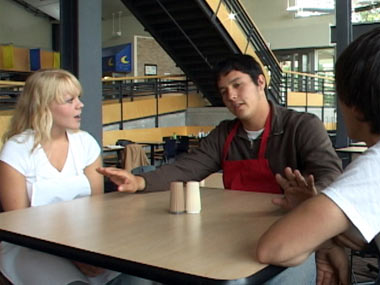Responding Social Skills (Work)
SchhoolSocial Skills is a three-part series covering the essential social skills needed in a school setting. The series covers Personal, Initiating, and Responding Social Skills. This program is a higher level version of our Responding Social Skills How-To series. This Learning Activity Series (LAS) approaches the content in a way that is more suitable for advanced users, using interactive lessons based upon video modeling. Responding Social Skills covers responding conversation skills such as Listen and Respond to Others, Follow Directions, Understand the Feelings of Others, Handle Criticism, Respond to Peer Pressure, Problem Solving, Deal With an Angry Person, Manage Your Anger, and Being Embarrassed.

- Stop and look at the speaker
- Show that you are listening
- Ask questions for understanding
- Repeat what you think is said
- Think about feelings
- Don’t interrupt
- Don’t judge
- Decide how to respond
- Respond
Follow Directions
- Look at the person
- Listen carefully to the directions
- Repeat the directions
- Think about what to do
- Ask questions
- Follow the directions
- Look at the person’s face
- Look at the person’s eyes
- Look at the person’s bodily actions
- Listen to what the person says
- Ask questions to get a better understanding
- Decide what the person is feeling
- Decide what to say or do
- Look at the person’s face
- Look at the person’s eyes
- Look at the person’s bodily actions
- Listen to what the person says
- Ask questions to get a better understanding
- Decide what the person is feeling
- Decide what to say or do
Handle Criticism
- Look at the person
- Listen to the criticism
- Don’t get angry
- Learn to accept fair criticism
- Ask questions
- Ask for ways to improve
- Decide to act on the criticism
Respond to Peer Pressure
- Try to understand
- You are in control
- You can choose how to act
- Say no
- Give a reason for not doing what they want
- Ignore the person
- Change the subject
- Walk away
- Know there is a problem
- State the problem
- Get the facts
- Organize the facts
- Think about the facts
- Find the causes
- Make a plan
- Do the plan
- Look at the results
Deal With an Angry Person
- Know that someone is angry
- Let them show their anger
- Later, ask them what was wrong
- Decide if it was your fault
- If it is your fault, tell the person that you are sorry
- Tell the person that you will try to correct your actions
- Try to do better
